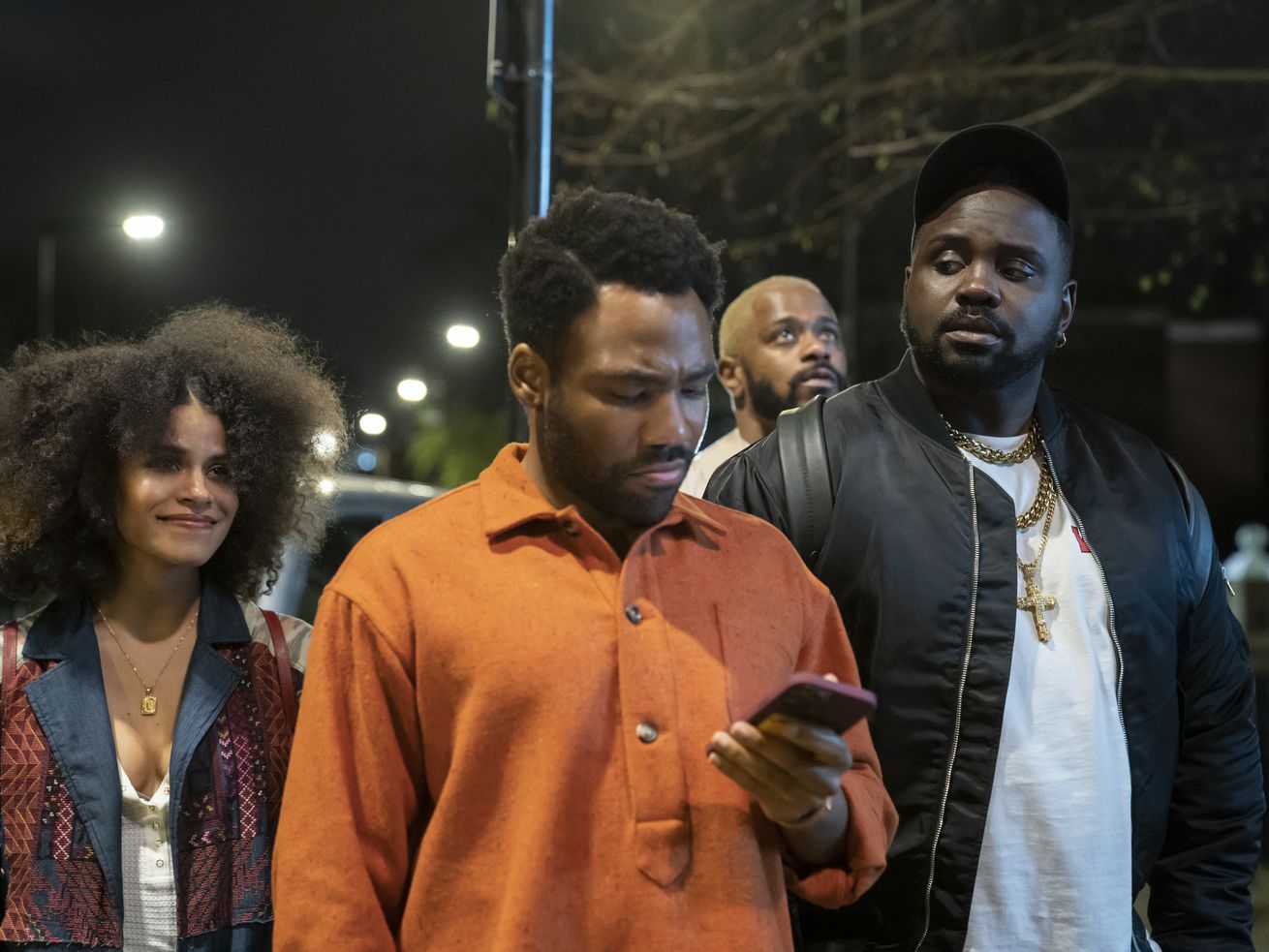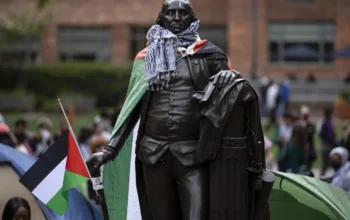The FX hit leans into the surreality of being Black.
The long-awaited third season of Atlanta aims to interrogate “the curse of whiteness,” according to head story writer Stephen Glover, who’s also the brother of creator Donald Glover. The FX comedy/drama/horror series has been on hiatus since 2018. In that time Atlanta’s voice has grown more assured in Afrosurrealism, making its depiction of the monstrosity of whiteness a smart, gloriously depraved, weird, condemning commentary.
The theme of whiteness and how it haunts and damns its own recipients becomes almost cartoonishly apparent by the first scene of season three, later revealed to be a dream within Earn’s (Donald Glover) own dream sequence. Dreams have long been the perfect medium for surrealist art. A stylistic movement developed in the aftermath of World War II, surrealism uses discomfiting, contradictory, irrational images to evoke a dream-like state of being. The subconscious takes these images and reorders them, and attempts to make sense of the images’ own reality. Afrosurrealism is, then, a movement that uses these tools to look closely at the already-surreal reality of Black people.
The opening scene features two fishermen at night — one Black and one white — and evokes the terrifying history and folklore behind Georgia’s Lake Lanier, where the government flooded an entire community, including a graveyard, so they could build a lake that would generate power and water supply to surrounding areas. In the eyes and professed experiences of many locals and visitors, Lake Lanier is haunted with ghosts who sometimes appear and drag people underneath the waters. Atlanta’s mock Lake Lanier is built on top of a Black town.
“With enough blood and money, anyone can be white,” the white fisherman says, sipping a can of beer amidst the dark waters. “The thing about being white is, it blinds you. It’s easy to see the Black man as cursed because you’ve separated yourself from him, but you don’t know you’re enslaved just like him.”
This is a clear thesis for the third season as well as a warning for our foursome currently traveling Europe while Paper Boi (Brian Tyree Henry) is on a seemingly wildly successful tour: Don’t get caught up with these white people, don’t lose yourself in the money. Atlanta started off as a show about intermittently homeless Earn managing his drug dealer/rapper cousin Paper Boi’s burgeoning music career, while navigating a complex relationship with Van (Zazie Beetz), who is the mother of his child and on-again off-again girlfriend. While season three may not have stability in terms of relationships — it’s hard to know where Van and Earn stand as she explores Europe with him and his friends — it does mark the first time that the characters are not embroiled in a crisis of financial survival.
But for anyone who thought Earn, Darius (LaKeith Stanfield), Van, and Alfred’s European travels would be a lighter romp than their adventures in Atlanta, season three quickly proves them wrong. The world of whiteness the characters are exposed to in London and Amsterdam is perhaps more frightening and monstrous than the one they left behind in the sprawling urban forest of Atlanta, surrounded by Confederate flags and monuments to slavery. This genteel horror is viscerally explored in an episode two scene where a white death doula comforts Van as a Black man lies dying. That same doula later pulls a lever that results in the Black man’s violent assisted suicide by suffocation, as a room of white people watch. It’s not transferring white souls into Black bodies like in Jordan Peele’s movie Get Out (2017), but it’s somehow more horrifying in its dream-like believability.
Atlanta’s firm hold on reality, even within its wild plotlines, is perhaps no clearer than in the first episode, “Three Slaps.” Viewers are introduced to Loquareeous, a Black boy who causes disruptions at school. His mother and grandfather are called to the school for a disciplinary meeting, and after a harsh lecture from his mother, he is given three light slaps across the face by his grandfather. A school administrator calls Child Protective Services, and Loquareeous is then taken to live with a white lesbian couple with three other Black children. His name is changed to “Larry,” and he is starved and forced to work in the garden and at the market.
The episode is based off the real-life story of the Hart family, who drove off a cliff with their adopted children in tow, in a murder-suicide. The children had repeatedly complained to neighbors about the starvation, abuse, and racism they faced at the hands of the Harts. Loquareeous is based on Devonte Hart, who had previously gone viral in a tearful photo of him hugging a police officer, which now has a sinister implication. While “Three Slaps” is often humorous, it’s disturbing and deeply uncomfortable when one realizes that the script is so close to the Hart murders. Black reality is horrifying, Atlanta states simply. And white people are monstrous.
/cdn.vox-cdn.com/uploads/chorus_asset/file/23403248/ATL_301_0139r.jpg)
Guy D’Alema/FX
Yet, Atlanta’s strongest episodes have always been when they lean into what some rather lazily call “Get Out-esque” writing. In truth, Atlanta is very far from Get Out. It’s more ambitious and nuanced, more masterfully funny, more heartbreaking and thought-provoking. Plotlines are less obvious and yet completely familiar, weirder and more rooted in reality. As opposed to Get Out’s rather sci-fi exploration of racism, Atlanta’s most terrifying moments still manage to feel plausible and deeply familiar.
That sci-fi exploration of racism that made Get Out so successful is not necessarily a present element in Atlanta’s third season. Comparing the two might seem innocuous, but in many ways, Get Out is more Afrofuturistic than it is Afrosurrealist. Yes, the film does use Afrosurrealist aesthetics, but overall it seems more concerned with the frightening possibilities of Black life in tandem with increasing technological advancement.
Atlanta’s season three, on the other hand, is concerned with dissecting the present, the mode of Afrosurrealism. As writer D. Scot Miller said, contrasting Afrofuturism and Afrosurrealism, “There is no need for tomorrow’s-tongue speculation about the future. Concentration camps, bombed-out cities, famines, and enforced sterilization have already happened … What is the future? The future has been around so long it is now the past.”
Get Out engages the fantastic — the unbelievable, the impossible, the mind-boggling, like human souls being transplanted into Black bodies. Atlanta is rooted in the marvelous — images of daily life made more striking, more dream-like, the wit of it all sharpened to an impossibly lethal point, while not compromising on the brutalities of reality. Think of Alfred not getting his money back from the billionaire in London with South African ties. This powerful white man preferred to pretend to be asleep rather than confront his gambling debt. He wakes to an angry Alfred, who tries to negotiate between Atlanta-style conflict resolution and European-style conflict resolution, and ultimately chooses Atlanta as he takes a chainsaw to the man’s priceless tree.
The marvelous is a key feature of Afrosurrealism, as explored by Suzanne Césaire, a surrealist thinker and wife of French Martinican poet, author, and politician Aimé Césaire. The season’s intensified dedication to Afrosurrealism, to seeking the marvelous, is embedded in the promotional poster itself, which renders the cast into abstract surrealist paintings.
Loquareeous’s story, brutal and enraging as it is, exemplifies the marvelous in many ways, especially in how he survives at the end. That survival both mimics the fact that Devonte Hart’s body has never been found and simultaneously enters Devonte Hart into a fictional place of rest. We see this in the ending scene, where Loquareeous is watching TV and eating spaghetti. As the camera steadies its gaze on Loquareeous’s back and zooms in, the reader becomes overcome with emotion, remembrance, rage, and awe. This is the marvelous: A simple image of a boy eating the food he once rejected and watching TV, weighted with meaning. This is Black reality, made clearer by its placement within a dream.
Atlanta doesn’t need to decide if it’s horror, or comedy, or a tender show depicting life’s daily moments of despair and triumph. For Black people, our realities enmesh all three into an absurd plateau. For other writers and creators, the absurdity might seem to mock the oppressed. But in the Glovers’ and the rest of their team’s deft hands, the absurdity becomes an indictment of our oppressors as well as a celebration of Black people’s humor. I intentionally say that Atlanta celebrates Black humor and not the way that Black people use humor as resilience, because it is the latter that Atlanta seems firmly set against.
Anywhere there is humor and Blackness, the impulse to say the art celebrates “Black resilience” emerges, partly because of this country’s obsession with depicting Black people as hardy creatures meant to endure the worst of atrocities, all while singing and laughing. But while Atlanta constantly depicts resilience, it does not celebrate it. It scorns the conditions that make that resilience necessary, and it uplifts those who find it hard to navigate the expectation of resilience. In fact, it derives a significant part of its absurdity from the characters’ varying degrees of resilience.
The further this show’s characters get away from their eponymous city, the further they get from the intimacy between Black people that made Atlanta special. Instead, however, a new kind of intimacy is forged. A discomfiting, thought-provoking, and one-sided intimacy with whiteness.
It’s that forced relationship to whiteness that gives Atlanta its absurdity — not just the presence of whiteness, but the influence on our spaces. Atlanta is a story of people who already knew these horrifying truths, to the point where they find them predictable, nearly boring. Atlanta doesn’t expect more from white people, it believes they are capable of anything. And in fact, it shows us, through modeling episodes based on real-life events and dynamics, that perhaps white people are capable of anything.
“Now it’s the Blackest, the most surreal, the most hilarious. I say this shit with no fear, because I already know what it’s going to be: the most unexpected thing you have ever seen,” LaKeith Stanfield told GQ Hype of Atlanta’s junior season. “But the truth is, it’s becoming hard to make shit up, because the actual reality is crazier than the shit you could come up with.”
Intimacy with whiteness is not novel or inauthentic. It is just as much a cornerstone of the Black experience in America as our closeness with each other is — which is the most surreal thing, when you think about it. How does one feel this anticipatory closeness to one’s oppressor? A violent disinterest and boredom with them, because we know so much?
James Baldwin spoke of this phenomenon at length, perhaps most damningly here: “You cannot lynch me and keep me in ghettos without becoming something monstrous yourselves. And furthermore, you give me a terrifying advantage. You never had to look at me. I had to look at you. I know more about you than you know about me.”
The characters of Atlanta embody this quote, in that they are constantly being forced to observe and analyze whiteness against their will. They are, even in their indifference towards whiteness, experts in the field. When Earn walks into the household of the white South African whose family owned the first bank and he sees a picture of a Black servant in the background of one of their pictures, he isn’t shocked but depressingly bored.
Atlanta’s glorious weirdness, its dive into the surreal, is what makes the show nimble and wonderfully written. It covers a wide spectrum of Blackness, all while being relatable. If it’s hard to imagine that a show where invisible cars run people over outside the club, alligators hang out in bathrooms, and old white men profess their love for the sexual “ectoplasm” of Black ghosts could be relatable to Black people, then you’ve missed the point. Blackness is strange, inherently bizarre. Shows that attempt to depict Black life without reveling in weirdness feel too curated, too stifling and specific. Other works may represent a slice of Blackness, but Atlanta’s oddities are more legible, and manage to fit us all underneath its strange and marvelous umbrella.
Author: Nylah Burton
Read More



